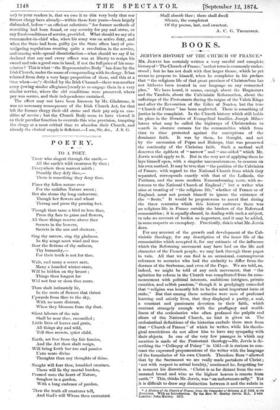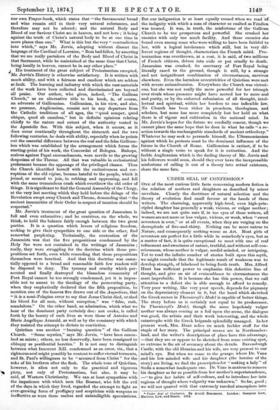BOOKS.
JERVIS'S HISTORY OF THE CHURCH OF FRANCE.*
MR. JERVIS has certainly written a very careful and complete. historyof "The Church of France." as that term is commonly under, stood ; but he has not dealt with that larger theme, which he yet seems to propose to himself, when he complains in his preface that "the religious life of that great province of Christendom has not hitherto been treated in our language on any connected plan." We have beard, it seems, enough about the Huguenots and the Vaudois, about the Calvinistic Reformation, about the sufferings of the Protestants during the reigns of the Valois Kings and after the Revocation of the Edict of Nantes, but the true "Church of France" has been neglected. There is something of justice in the complaint. In the Church history which still holds its place in the libraries of Evangelical families, Joseph Milner leaves what may be called the highways of Christendom to search in obscure corners for the communities which from time to time protested against the corruptions of the dominant faith. It was by them, he thought, and not by the succession of Popes and Bishops, that was preserved the continuity of the Christian faith. Such a method well deserves the epithets of " narrow " and " one-sided " which Mr. Jervis would apply to it. But in the very act of applying them he lays himself open, with a singular unconsciousness, to censure on his own method. It may be true that "the position of the Calvinists of France, with regard to the National Church from which they separated, correspontls exactly with that of the Lollards, the Puritans, and the more modern Nonconforming sects, with re- ference to the National Church of F. gland ;" but a writer who aims at treating of "the religious life," whether of France or of England, must not permit himself to ignore the existence of the "Sects." It would be preposterous to assert that during the three centuries which this history embraces there was no religious life in France outside the borders of the Reformed communities ; it is equally absurd, in dealing with such a subject, to take no account of bodies so important, and it may be added, in some respects so exemplary. Practically, this is what Mr. Jervis does.
For any account of the growth and development of the Cal- vinistic theology, for any description of the inner life of the communities which accepted it, for any estimate of the influence which the Reforming movement may have had on the life and character of the French people, we may look through these pages in vain. All that we can find is an occasional, contemptuous reference to sectaries who had the audacity to differ from the decrees of the Sorbonne, and even of the Pope. We are told, as, indeed, we might be told of any such movement, that "the agitation for reform in the Church was complicated from its com- mencement with political interests, ambitious intrigues, private enmities, and selfish passions," though it is grudgingly conceded that "religion was honestly felt to be the mbsst important issue at stake." But that among these sectaries were men of profound learning and saintly lives, that they displayed a purity, a zeal, a constant and passionate devotion to their faith, which contrast strangely enough with the profligacy and world- liness of the ecclesiastics who often profaned the pulpits and altars of the. National Church, no hint is given us. The ecclesiastical definitions of the historian exclude these men from that "Church of France" of which he writes, while his theolo- gical convictions do not allow him to have any sympathy with their objects. In one of the very few passages in which any mention is made of the Protestant theology—Mr. Jervis is de- scribing the "Colloquy of Poissy " in 1561—it is curious to con- trast the expressed prepossessions of the writer with the language of the formularies of his own Church. Theodore Beza "allowed that by the Sacrament we are really made partakers of Christ ; 'not with respect to actual locality,' continued he, forgetting for a moment his discretion. Christ is as far distant from the con- secrated bread and wine as the highest heaven is remote from earth." This, thinks Mr. Jervis, was "an unfortunate sally." Yet it is difficult to draw any distinction between it and the rubric in
* A History of the Church of France, from the Concordat of Bologna, A.D. 1516, to the Rerolidion. With an Introduction. By the Rev. W. Henley Jervis, M.A. 2 vole London : John Murray. 1872.
our own Prayer-book, which states that "the Sacramental bread and wine remain still in their very natural substances, and therefore may not be adored ; and the natural Body and Blood of our Saviour Christ are in heaven, and not here ; it being against the truth of Christ's natural body to be at one time in more places than one." What is this but the very" contradiction into which," says Mr. Jervis, adopting without dissent the language of the Cardinal of Lorraine, " Beza had fallen, by asserting that we are really partakers of the Body and Blood of Christ in that Sacrament, while he maintained at the same time that Christ, being locally in heaven, cannot be in any other place."
His treatment of the great subject of Protestantism excepted, - Mr. Jervis's History is otherwise satisfactory. It is written with much ability, and with a fairness and candour which are seldom at fault. The learning and industry with which the vast materials of the work have been collected and discriminated are beyond all praise. Our author, who gives, indeed, "The Gallican Church," as an alternative title to his book, is, of course, an advocate of Gallicanism. Gallicanism, in his view, and also, we presume, Anglicanism, consist not in any departure from the Catholic traditions of all ages, the " quod semper, quod ubique, quad ab omnibus," but in definite opinions relating chiefly to the nature and extent of the authority vested in the Apostolic See. With this subject, when it occurs, as it does occur continually throughout the sixteenth and the two following centuries, he deals with ability, especially when he points out the essential difference between the real and the false Gallican- ism which was established by the arrangement which forms the starting-point of his work, the Concordat of Bologna. Bishops, zealous against Papal encroachments, were servile to the growing despotism of the Throne. All that was valuable in ecclesiastical preferment became the appanage of the privileged classes. Thus the Church identified herself with the exclusiveness and cor- ruptions of the old regime, became hateful to the people, which it joined, or seemed to join, in robbing and oppressing, and fell with the same tremendous crash which overthrew the old order of things. It is significant to find the General Assembly of the Clergy, at the -very last meeting which they held before the deluge of the Revolution swept away Church and Throne, demanding that the ancient immunities of their Order in respect of taxation should be respected."
Mr. Jervis's treatment of the great question of Jansenism is full and even exhaustive ; and he contrives, on the whole, we think, to hold the balance fairly enough between the two great parties. It is a question which lovers of religious freedom, seeking to give their sympathies to one aide or the other, find somewhat perplexing. Technically, the contention of the Jansenists was that the five propositions condemned by the Holy See were not contained in the writings of Jansenius ; really, they were struggling for the doctrine which those pro- positions set forth, even while conceding that those propositions themselves were heretical. And that this doctrine was essen- tially opposed to a broad and reasonable faith few readers will be disposed to deny. The tyranny and cruelty which per- secuted and finally destroyed the blameless community of Port Royal cannot be too strongly condemned, yet it is impos- sible not to assent to the theology of the persecuting party, when they emphatically declared that the fifth proposition, to mention one of the famous five drawn out of the Augusiinus, that "it is a semi-Pelagian error to say that Jesus Christ died, or shed his blood for all men, without exception," was "false, rash, scandalous." On the other hand, an admiration, which what we hear of the dominant party certainly doer not evoke, is called forth by the beauty of such lives as were those of Antoine and Marie Angelique Arnauld, as well as by the constancy with which they resisted the attempt to dictate to conviction.
Quietism was another "burning question" of the Gallican Church. "Some mystics," says Mr. Jervis, "have been canon- ised as saints ; others, no less deservedly, have been consigned to obloquy as pestilential heretics." It is not easy to distinguish between what Innocent XII. condemned as an error, viz., that a righteous soul might possibly be content to suffer eternal torments, and St. Paul's willingness to be "accursed from Christ " for the sake of his brethren after the _flesh. The whole tone of Quietism, however, is alien not only to the practical and vigorous
\II piety, not only of Protestantism, but also, it may be said, of Western Christianity. We can at least sympathise with the impatience with which men like Bossuet, who felt the evil of the days in which they lived, regarded the attempt to fight an ever-growing force of profligacy and scepticism with weapons so ineffective as were these useless and unintelligible speculations.
But our indignation is at least equally roused when we read the indignity with which a man of character so exalted as Fdnelon was treated. It was, in truth, the misfortune of the Gallic= Church to be too prosperous and powerfuL She crushed her enemies with only too much facility. And these enemies she found even among some who were willing to have been faithful to her, with a logical intolerance which still, but in very dif- ferent regions of thought, characterises the French mind. Pro- testantism was overthrown, at a cost, it is said, of two millions of French citizens, driven into exile or put cruelly to death. Jansenism was crushed, its sanctuary of Port Royal being literally razed to the ground, though it still, by a strange and not insignificant combination of circumstances, survives elsewhere. Even the harmless eccentricities of Quietism were met with severe animadversion. Everywhere the Church was victori- ous, but she was not really the more powerful for her triumph over rivals whose presence might have moved her to more zeal and purity, or by the enforced submission of all thought, intel- lectual and spiritual, within her borders to one inflexible law. No Church has been richer in preachers, theologians, and scholars, but none has more completely lost her hold on what there is of vigour and cultivation in the national mind. In Mr. Jervis's hopes for the future we cordially concur, though we cannot place the same hope that he does in what he calls "a re- action towards the unchangeable standards of ancient orthodoxy." Whatever he may seek to persuade himself, the Ultramontanism against which he protests must be the dominant influence of the future in the Church of Rome. Gallicanism is extinct, if to be without a single voice to speak for it is extinction. And the feeble Anglicanism which is the darling theory of Mr. Jervis and his followers would soon, should they ever have the inexpressible misfortune of calling it out of a theory into actual existence, share the same fate.































 Previous page
Previous page